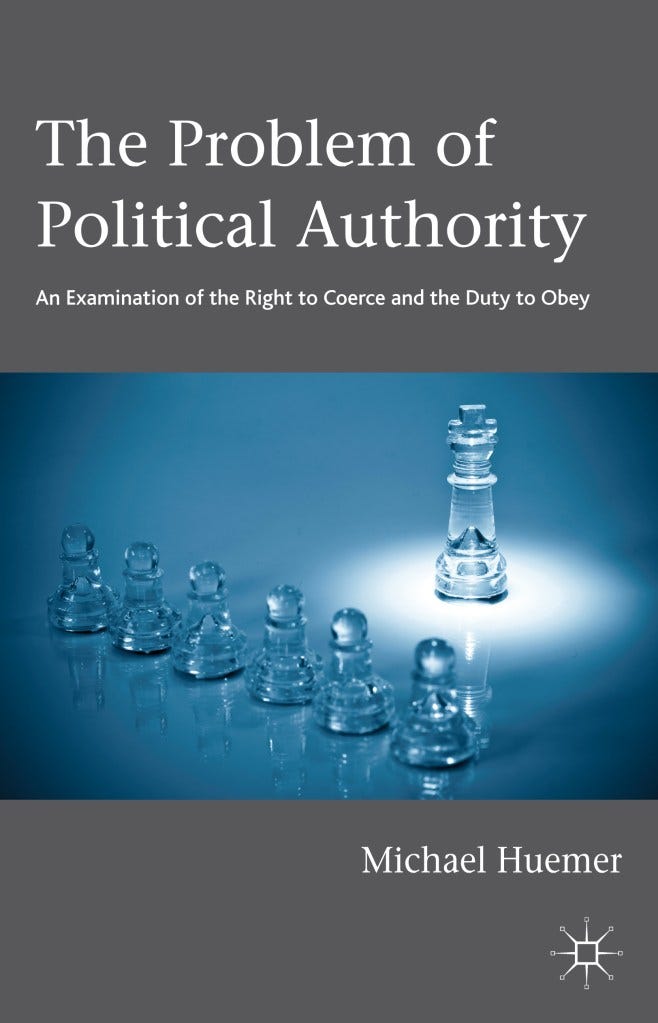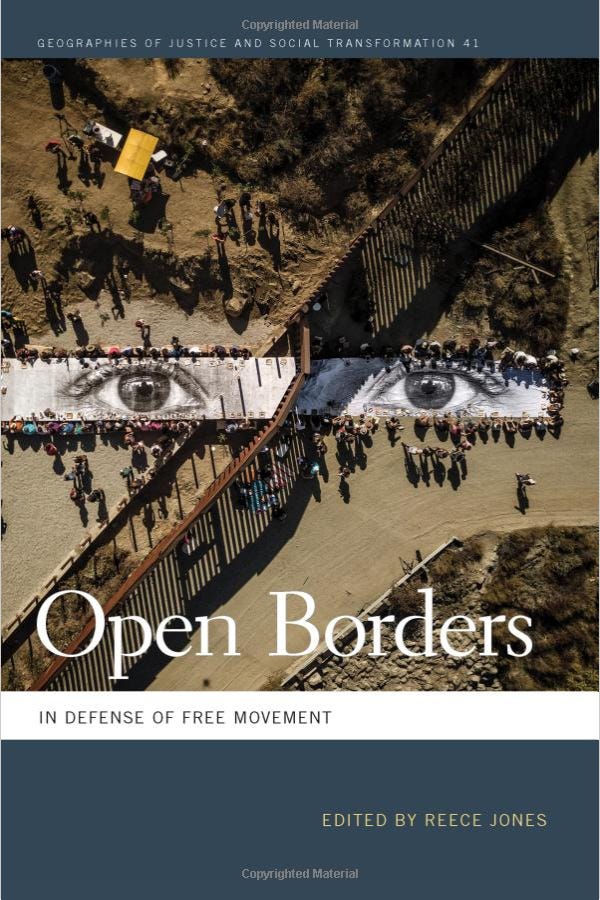In Defense of Illegal Immigration
Today (Oct. 19, 2019), I'm participating in the Open Borders Conference at the New School in New York -- https://freemigrationproject.org. In keeping with that, here is a post about why illegal immigration is cool. There's no reason to respect immigration laws.
1. Ethical Questions About Illegal Migration
Many people -- at least politicians during campaigns -- appear to express some indignation and condemnation at people who have "violated our laws!!" by immigrating illegally. Are such attitudes appropriate?
Sometimes it is suggested that these illegal migrants should be punished for their presumed misdeed. Would that be just?
If you have the chance to migrate and thereby improve your overall welfare, but doing so would be illegal, do you have a reason to refrain out of respect for the laws of your desired destination country?
I suggest that the answer to all of these is "no". Potential illegal migrants have no moral reason to respect immigration laws.
2. Things I Am Not Assuming
I am skeptical about political authority. I think that no state is legitimate, no one has political obligations, and no one has political authority. That stance would make it easy to answer the above questions. Since there is no obligation to obey the law in general (merely because it's the law), there is also no obligation to obey immigration laws.
Unfortunately, not everyone has read my book on The Problem of Political Authority. Worse, even some who have read it don't agree with it. So let's suppose we bracket that. I mention the issue of authority only to make clear that I am not assuming any controversial stance on that.
I also am not assuming anything controversial about the justification of immigration laws.
In other words, my claim is that even if the state has authority, and even if the immigration laws are entirely justified, there is still no moral reason at all for potential immigrants to respect the immigration laws.
How can that be? Briefly, (1) even if the state has authority, that authority only extends to its own citizens; and (2) even if there are good reasons for the state to adopt immigration restrictions, those reasons are not reasons that the migrants themselves have. (You might have a reason to try to prevent me from doing something, even while I have no reason not to do it.)
3. Accounts of Authority
Basically, all extant accounts of authority imply that the state's authority would not extend to potential illegal immigrants. I don't agree with any of these theories, but let's pretend that we think one of them is correct.
a. The Social Contract Theory
On this account, the state's authority derives from a contract with its citizens. We have to obey the government's laws, because we somehow ("implicitly"?) agreed to do so, in exchange for the state's protection.
On that view, this authority would not extend to would-be immigrants. People living in other countries are not parties to this state's social contract, even if the social contract exists. So they would not be obligated to obey this state's laws.
You might think: "Okay, they're not now obligated by our laws. But once they migrate into 'the government's territory', or perhaps when they start benefiting from some government services, they will become so obligated (even if they are not citizens). At that point, they will acquire an obligation to deport themselves, in order to stop violating the law."
Here is the problem. A contract involves some sort of exchange of value. When you sign a rental agreement, you agree to exchange some amount of money for a space to live in. When you sign an employment contract, you agree to exchange labor for money.
In general, it cannot be a condition on a contract that one party give up the very good that they are entering into the contract to receive. For instance, in a rental agreement, there couldn't be a clause that says the tenant can't use the apartment in any way. In an employment contract, the employee could not be required to never cash his paychecks.
Now, the central point of the social contract is for individuals to secure the benefits of peaceful cooperation in a given society. That is what the individual is supposed to be entering into the contract for. Therefore, the individual cannot be required, under that contract, to renounce living in that very society. So there could not be a social-contract-based obligation to deport oneself.
b. Fair Play
The Fair Play account says that, when there is a cooperative scheme that produces benefits for all (including you), you generally ought to do your fair share in supporting it; you should not free ride on the efforts of others. Thus, you should obey the law, because general obedience to the law in society is required for there to be peaceful and orderly social cooperation. If you decide to break the law while others are obeying it, then you're seeking to free ride on the sacrifices of others.
But it is a condition on having a fairness-based obligation that one actually receive a fair share of the benefits of the cooperative scheme in question. If the scheme produces benefits for others but excludes you, then you are not obligated to support it (at least, not by fairness considerations).
Thus, there is a similar constraint here as in the case of the social contract: it cannot be part of doing your "fair share" in supporting a cooperative scheme that you exclude yourself from the benefits of that very cooperative scheme.
Example: say you're on a lifeboat with several other people. The boat is taking on water and needs to be bailed. You should do your fair share by bailing out the boat. On the other hand, if someone suggests that you should do your fair share by jumping overboard to lighten the load on the boat, that's ridiculous. You don't have to do that.
In the case of our alleged political obligations, fair play might require one to obey almost all other laws. But it could not require one to obey a law whereby one would be entirely excluded from the society, for then one would receive none of the benefits of the social cooperation that one was contributing to. Hence, fair play cannot support an obligation to obey immigration restrictions.
c. Democracy
Some say that the state's authority is based on the will of the majority. Provided that the state is democratic, it has been authorized by the people to make the laws that it makes. For some reason, we have to obey the will of the people, so we have to obey those laws.
This theory obviously implies that non-democratic governments lack authority. Slightly less obviously, I think it also implies that those who are excluded by the state from the democratic process are also outside the state's authority. Defenses of democracy tend to emphasize the good of equality, which democracy is said to realize (see Christiano), or the good of well-conducted public deliberation (see Habermas, Cohen).
But the immigration laws are made without any participation from the main group that is affected by those laws -- the potential immigrants. They are given no vote, and no say in the making of those laws. So even if you think the democratic process confers authority on its outcomes in general, the potential immigrants in particular have no moral reason to respect these laws.
d. Freedom of Association
People in general have a right to freedom of association, which includes a right not to associate with others whom we do not wish to associate with. Perhaps this can be used to explain why the state has the right to make immigration restrictions -- perhaps this is an exercise of a right to freedom of (non-)association on the part of the nation's existing citizens.
Two problems: first, the right to avoid unwanted associations generally applies to substantial relationships, not extremely vague and tenuous "associations". For instance, if I don't like you, I can refuse to have you as an employee, friend, or spouse. I cannot, however, refuse to allow you to live in the same neighborhood as me -- that is much too weak of an "association" for me to claim rights over. I have a right against your moving into my house, but not against your moving into my neighborhood.
Second, the right to freedom of association includes a right to veto one's own associations with others, but does not include a right to veto other people's associations. E.g., if I don't like you, I can, again, refuse to hire, befriend, or marry you. But I cannot demand that third parties not hire, befriend, or marry you.
Now, immigration restrictions, to be justified by freedom of association, would require rights over extremely tenuous, vague associations -- such as a right not to merely be in the same vast geographical region as a certain other person -- or rights over other people's associations -- such as a right to demand that employers who want to hire a person not hire that person simply because you yourself don't want them to.
In my view, individuals have a right not to associate with immigrants or would-be immigrants, if they so choose. That is, one could refuse to hire, befriend, marry, etc., an immigrant. But one cannot justly demand that an immigrant not live anywhere in the same country as oneself (on someone else's property), nor can one justly demand that someone else not hire an immigrant (using their own money).
4. Reasons for Restriction
a. Jobs
Why should the state restrict migration? Some say that the state should do this in order to protect employment opportunities for low-skill native workers.
This might count as a reason for the state to restrict, provided that the state is justifiably partial toward low-skill native workers. But notice that this reason would not apply to the immigrants themselves -- the immigrants themselves have no reason to be partial to native workers. The immigrants rationally prefer themselves to be hired, just as native workers prefer themselves to be hired. If it's not wrong for a native worker to take a job that an immigrant could hold, then it's not wrong for an immigrant worker to take a job that a native could hold.
So, even if this is a good reason for the state to restrict, it isn't a good reason not to illegally migrate.
b. Fiscal Burdens
Some say that immigration imposes fiscal burdens on the government because immigrants consume social services and pay lower-than-average taxes (due to being poor).
This might be a reason for the state to restrict, again assuming the state is justifiably partial to native citizens. But again, there is no reason for the immigrants themselves to be partial to native citizens. If it's permissible for native citizens to consume social services and impose fiscal burdens on the state, then this should also be permissible for immigrants.
Now, some would say that it is impermissible to take handouts from the government. In that case, both natives and immigrants should refrain from doing it. But they still don't have to completely exile themselves from the society.
c. Political Change
Some say that we should restrict migration to prevent immigrants from changing the political culture of our society, e.g., by voting for authoritarian policies and leaders.
Again, assume that this is a good reason for the state to restrict. It still wouldn't be a good reason for the immigrants themselves not to illegally migrate. Of course, the immigrants, like all of us, should support freedom and not authoritarianism. If you have been voting for authoritarian candidates, what you should do is either start voting for good candidates or stop voting.
Many native-born voters support authoritarian values. No one thinks that they're obligated to exile themselves. Similarly, there's no reason why immigrants who support authoritarian values would be obligated to exclude themselves from the society. In both cases, they should change their values to support freedom; or, failing that, not participate in the political process.
Of course, illegal immigrants can't vote anyway, so they don't have to worry about directly supporting bad policies. Perhaps they should also be careful not to speak in favor of bad policies either.
Conclusion
Conclusion: even if the state has good reasons to restrict immigration and even if the state has authority (both of which points I doubt), there would still be no moral reason for the migrants themselves not to migrate illegally.
I discussed this all at greater length in my chapter contributed to this book: www.amazon.com/Open-Borders-Movement-Geographies-Transformation/dp/0820354260/





